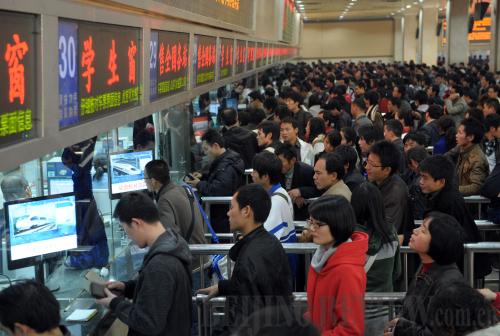|
 |
|
NEW TRIAL: Passengers queue at the Guangzhou Railway Station ticket lobby on January 14, 2010. In an attempt to control scalping, Chinese officials have implemented an identity verification system for train ticket purchasers (LIU DAWEI) |
February's Spring Festival, which features family reunions and is the country's most important traditional holiday, sets into motion tens of millions of migrants scattered throughout China. Their annual return home is considered to be the largest modern human migration on Earth.
It also presents the perfect opportunity for train ticket scalpers to make big money from the shortage of tickets that inevitably happens every year. Travelers usually wait in line for hours to buy a ticket at the station, and most times they are told tickets have sold out. When demand peaks, scalpers often sell tickets for twice their price or even higher.
This year Chinese authorities have implemented a system to try to control scalping—they will require real-name verification in 37 railway stations during the holiday rush.
The pilot program will require passengers to show their ID cards or other identification documents when purchasing tickets at train stations in south China's Guangdong, Hunan and Sichuan provinces. Foreign passengers looking to buy tickets will need to show their passports, permits for traveling to and from Hong Kong and Macao or residence permits.
Officials decided to launch the pilot project in the three provinces because millions of migrants from inland Sichuan and Hunan work in Guangdong, which is known as China's "factory for the world." The system will be in place from Spring Festival's traffic peak from January 30 to March 30, 2010. The festival, also known as China's lunar New Year, falls on February 14.
The National Development and Reform Commission expects there will be some 210 million train trips taken over the holiday, a rise of 9.5 percent from 2009.
A temporary solution
China's transport authorities have long been fighting scalpers, who are blamed for increasing shortages by stockpiling tickets and reselling them at much higher prices. Sichuan migrant worker Shi Yanhai said she had not gone home for five years because it was too hard to buy a train ticket during the Spring Festival traffic peak. She was confident that this year's pilot project would work and she would be able to travel home. "Hopefully I'll be able to buy a ticket this year after the real-name system takes effect," she said. A recent online survey by Chinese Internet portal Sohu.com showed that some 80 percent of respondents believed the new system would help curb scalping and make purchasing tickets easier during the holiday.
Though hailed as a brave approach to tackle a chronic problem, the new system still has flaws. The most obvious consequence will be the complicated process to purchase tickets and longer check-in time. Unlike an airplane that can only hold hundreds of passengers, a train normally carries about 2,000 passengers who take longer to board.
According to a statement issued by the Ministry of Railways, other forms of identification besides ID cards are applicable when purchasing tickets, such as diplomat certificates, military IDs and consulate certificates. But some question whether ticket sales staff will be able to verify the authenticity of these forms of identification.
The new system will also increase the workload of railway staff and requires an upgrade of facilities. "To improve the efficiency of the ticket check, we have added another 100 entrances and 3,000 ticket check staff at train stations," said Huang Xin, Director of the Passenger Service Department of the Guangzhou Railway Group. Huang's railway is part of the pilot project and has started to use a new ID recognition system that includes an ID card reader, a camera and a printer to shorten wait times." The real-name system aims to crack down on scalpers," Huang said. "We're sorry for the inconveniences that might be caused by the trial but we badly need the understanding and support of our passengers."
The railway administration also admits the new system is not perfect. "The system may have some positive results, but it will be met with great difficulty if it is to be put in use extensively," said Ministry of Railways spokesman Wang Yongping.
Yang Hong, a transport professor at Guangdong's Shantou University, believed that the fundamental solution to the ticketing problem lies in improving the capacity of the country's railways.
"No other country has tried such a ticket system that requires personal information details. Such an approach needs to be thought over again as it removes personal privacy," said Dong Yan, a macroeconomic analyst with the National Development and Reform Commission. | 